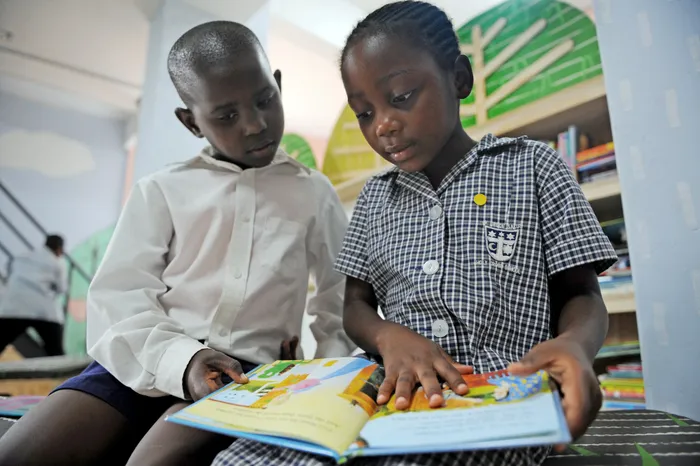More than 70% of pupils in foundation phase have poor reading skills - study

Tresh Shaurwa (6) and Qhama Mfengwana (6) read to each other. File Picture: Armand Hough/African News Agency(ANA)
Johannesburg - Reading abilities among the country’s foundation phase learners remained so poor that further amendments to the language curriculum were necessary.
This was revealed in a groundbreaking report prepared by researchers from various universities and organisations, including the universities of Cape Town, Stellenbosch, Unisa and Chicago, US.
The Department of Basic Education confirmed that the study would inform curriculum practice.
Its researchers contributed to the study, released about four years after the Progress in International Reading
Literacy Study revealed that 78% of Grade 4 learners in South Africa could not read for meaning. The new study analysed assessments of 16 400 siSwati, isiZulu and isiXhosa learners in grades one to three. The assessments were conducted for five different studies between 2016 and 2019.
The final report revealed that while all learners as an established benchmark should be able to read 35 correct words per minute by the end of third grade, more than 70% of the local learners lagged far behind.
“Currently, by the end of Grade 3, most learners (53% to 76%, depending on the sample) have only reached the lower threshold of 20 correct words read per minute. Approximately a quarter of learners have reached the benchmark of 35 correct words read per minute and would benefit from a strong instructional focus on comprehension skills,” the report said.
Over half of the learners reach the Grade 2 reading threshold of 20 words per minute by the end of the third grade. “By the end of Grade 2, all learners should be able to read at least 20 correct words per minute. This is a minimum threshold,” the report said.
“If learners do not reach this level of fluency, higher order reading skills are very unlikely to develop.
“The proportion of learners in these data samples that are non-readers by the end Grade 3 remains unacceptably high (15% to 26% were unable to read one word from a passage).”
But the curriculum itself failed the learners by being weak in inculcating the ability to read complex Nguni language consonants. These formed the cornerstone of the languages.
“Learners also experience significant difficulty in reading complex consonant sequences (examples include hl, dl, kh, tsh, ndl, gcw, ntsw) in grades 1 and 2,” said the report.
“These sounds feature regularly in Nguni languages and knowledge of these more complex consonant sequences is necessary to read most Grade 1 level texts in these languages Thus, mastery in reading these is required early on.
“This may require an adjustment to the Nguni language curriculum, which does not include the teaching of complex consonant sequences in Grade 1.”
Grade R, too, needed to be looked into as many pupils started Grade 1 without knowing their ABCs.
“Far too many learners are entering Grade 1 with no letter-sound knowledge, despite most having attended Grade R,” said the study.
“We also identify that one in 10 learners in this sample are still unable to sound one letter-sound correctly by the end of Grade 3.”
Mathanzima Mweli, the director-general of the department, said the report was a welcome contribution to the sector.
The Star
Related Topics: